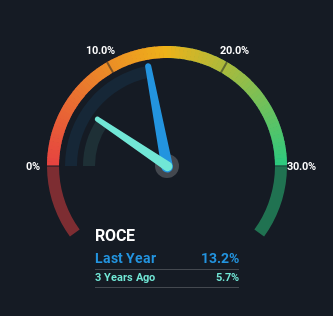- India
- /
- Auto Components
- /
- NSEI:BOSCHLTD
Investors Met With Slowing Returns on Capital At Bosch (NSE:BOSCHLTD)

To find a multi-bagger stock, what are the underlying trends we should look for in a business? In a perfect world, we'd like to see a company investing more capital into its business and ideally the returns earned from that capital are also increasing. This shows us that it's a compounding machine, able to continually reinvest its earnings back into the business and generate higher returns. Although, when we looked at Bosch (NSE:BOSCHLTD), it didn't seem to tick all of these boxes.
What Is Return On Capital Employed (ROCE)?
Just to clarify if you're unsure, ROCE is a metric for evaluating how much pre-tax income (in percentage terms) a company earns on the capital invested in its business. To calculate this metric for Bosch, this is the formula:
Return on Capital Employed = Earnings Before Interest and Tax (EBIT) ÷ (Total Assets - Current Liabilities)
0.13 = ₹15b ÷ (₹163b - ₹50b) (Based on the trailing twelve months to June 2023).
So, Bosch has an ROCE of 13%. That's a relatively normal return on capital, and it's around the 14% generated by the Auto Components industry.
Check out our latest analysis for Bosch

In the above chart we have measured Bosch's prior ROCE against its prior performance, but the future is arguably more important. If you'd like to see what analysts are forecasting going forward, you should check out our free report for Bosch.
What Can We Tell From Bosch's ROCE Trend?
Things have been pretty stable at Bosch, with its capital employed and returns on that capital staying somewhat the same for the last five years. It's not uncommon to see this when looking at a mature and stable business that isn't re-investing its earnings because it has likely passed that phase of the business cycle. So unless we see a substantial change at Bosch in terms of ROCE and additional investments being made, we wouldn't hold our breath on it being a multi-bagger.
The Key Takeaway
In summary, Bosch isn't compounding its earnings but is generating stable returns on the same amount of capital employed. And with the stock having returned a mere 3.8% in the last five years to shareholders, you could argue that they're aware of these lackluster trends. As a result, if you're hunting for a multi-bagger, we think you'd have more luck elsewhere.
If you want to continue researching Bosch, you might be interested to know about the 1 warning sign that our analysis has discovered.
While Bosch isn't earning the highest return, check out this free list of companies that are earning high returns on equity with solid balance sheets.
Valuation is complex, but we're here to simplify it.
Discover if Bosch might be undervalued or overvalued with our detailed analysis, featuring fair value estimates, potential risks, dividends, insider trades, and its financial condition.
Access Free AnalysisHave feedback on this article? Concerned about the content? Get in touch with us directly. Alternatively, email editorial-team (at) simplywallst.com.
This article by Simply Wall St is general in nature. We provide commentary based on historical data and analyst forecasts only using an unbiased methodology and our articles are not intended to be financial advice. It does not constitute a recommendation to buy or sell any stock, and does not take account of your objectives, or your financial situation. We aim to bring you long-term focused analysis driven by fundamental data. Note that our analysis may not factor in the latest price-sensitive company announcements or qualitative material. Simply Wall St has no position in any stocks mentioned.
About NSEI:BOSCHLTD
Bosch
Engages in the manufacture and trading of automotive products in India and internationally.
Flawless balance sheet average dividend payer.


